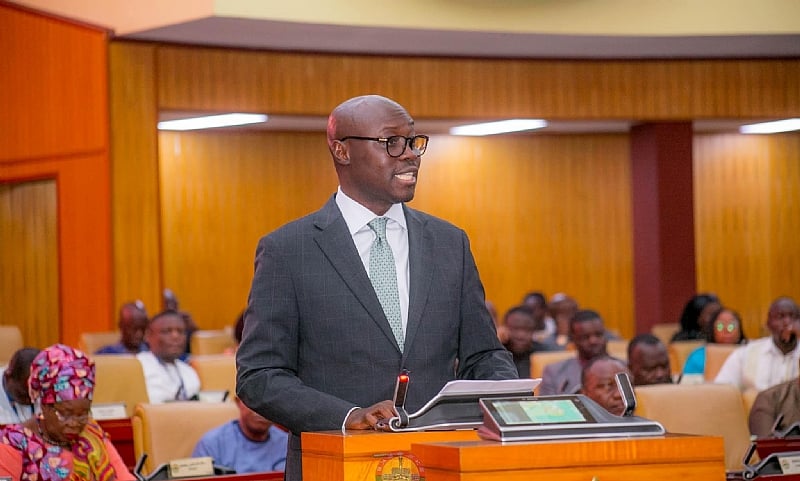Dr. Cassiel Ato Baah Forson, the National Democratic Congress (NDC) Parliamentary Caucus Leader, has openly expressed his frustration over the New Patriotic Party (NPP) Caucus’s absence during a recall session in Parliament scheduled for November 7. This significant event followed the recall call initiated by the NPP Caucus, as per Article 112 (3) of the Constitution and Order 53 of the Standing Orders. The NPP Caucus’s failure to be present led to the Speaker of Parliament adjourning the House indefinitely, citing a lack of business to conduct. Forson articulated that the NDC Caucus was deeply disappointed and viewed the NPP’s absence as a serious disrespect towards parliamentary responsibilities, particularly given that they had convened on short notice after adjusting their own schedules in anticipation of the session.
During a briefing with the Parliamentary Press Corps post-adjournment, Dr. Forson detailed the NDC’s commitment, sharing that numerous members had disrupted their campaign schedules to fulfill their parliamentary duties. He highlighted the irony of the NPP’s absence, noting that they were the very party that triggered the recall. Forson stated that the NPP’s failure to attend the Business Committee meeting earlier that day exacerbated his concerns, as the Committee Clerk was unreachable, further hindering any collaboration on the day’s agenda. He categorized this behavior as an abuse of parliamentary protocol and outlined the financial implications of such actions on the state, emphasizing that this was not an isolated occurrence for the NPP.
Forson subsequently called for public accountability, urging the citizens of Ghana to take note of the NPP’s actions and to respond in the upcoming December general elections. He remarked that the NPP appeared to be disengaged and unprepared to address the struggles faced by the populace. In stark contrast to the NPP’s absence, the NDC was well represented in the Chamber, with over 100 MPs present, reflecting their readiness to engage in legislative duties, and highlighting the party’s commitment to working for the people of Ghana.
The political landscape was further complicated by recent controversies regarding Parliament’s majority status. Following the declaration by Speaker Alban Bagbin that four parliamentary seats had become vacant due to breaches of Article 97(1)(g) and (h) of the Constitution, the NPP and NDC engaged in a significant power struggle. The seats in question—held by Cynthia Mamle Morrison (Agona West), Kwadjo Asante (Suhum), Peter Kwakye-Ackah (Amenfi Central), and Andrew Asiamah Amoako (Fomena)—were vacated under the stipulation that members who switch party affiliation or pursue independent candidacy during their term must vacate their seats.
The Speaker’s ruling, prompted by concerns raised by Forson regarding these breaches, shifted the parliamentary majority to the NDC with 136 MPs compared to the NPP’s 135. However, this development was met with legal scrutiny, as the Supreme Court intervened to reverse the Speaker’s ruling temporarily, allowing the four MPs to maintain their participation in parliamentary proceedings until a ruling on the matter is provided on November 11. The legal entanglement spotlighted the disproportionate nature of parliamentary representation and the ongoing friction between the two leading political parties in the country.
As the situation continues to evolve, it is evident that the tension between the NDC and NPP is symptomatic of deeper political divisions within Ghana. The NDC’s criticism of the NPP not only reflects intra-party dynamics but also signals broader implications for the upcoming elections. Forson calls for public assessment of the NPP’s actions, suggesting that their lack of participation ought to be seen as a failure in governance that should not go unpunished at the ballot box. The political atmosphere is charged, as both parties prepare for the electoral contest while grappling with the ramifications of their respective strategies and parliamentary conduct.
In conclusion, the dynamics of the Ghanaian Parliament and the behavior of its members during this incident have highlighted critical issues regarding accountability, respect for democratic processes, and effective governance. The NDC’s proactive response contrasts sharply with the NPP’s apparent disinterest, underscoring varying degrees of commitment to fulfilling parliamentary obligations. As the political landscape shifts ahead of the December elections, the electorate’s perception will be pivotal in determining the future of both parties amid escalating tensions and legislative disputes.














